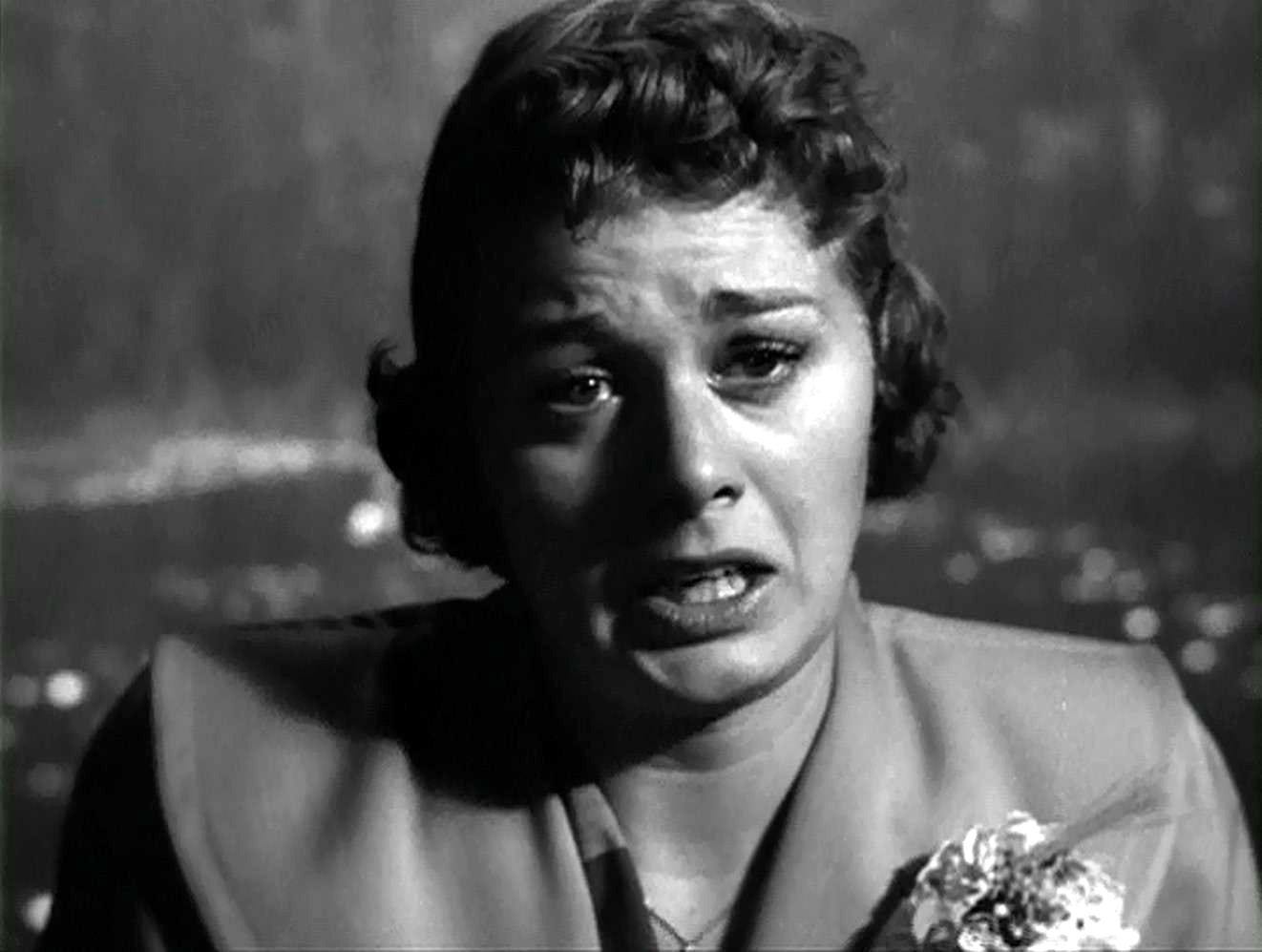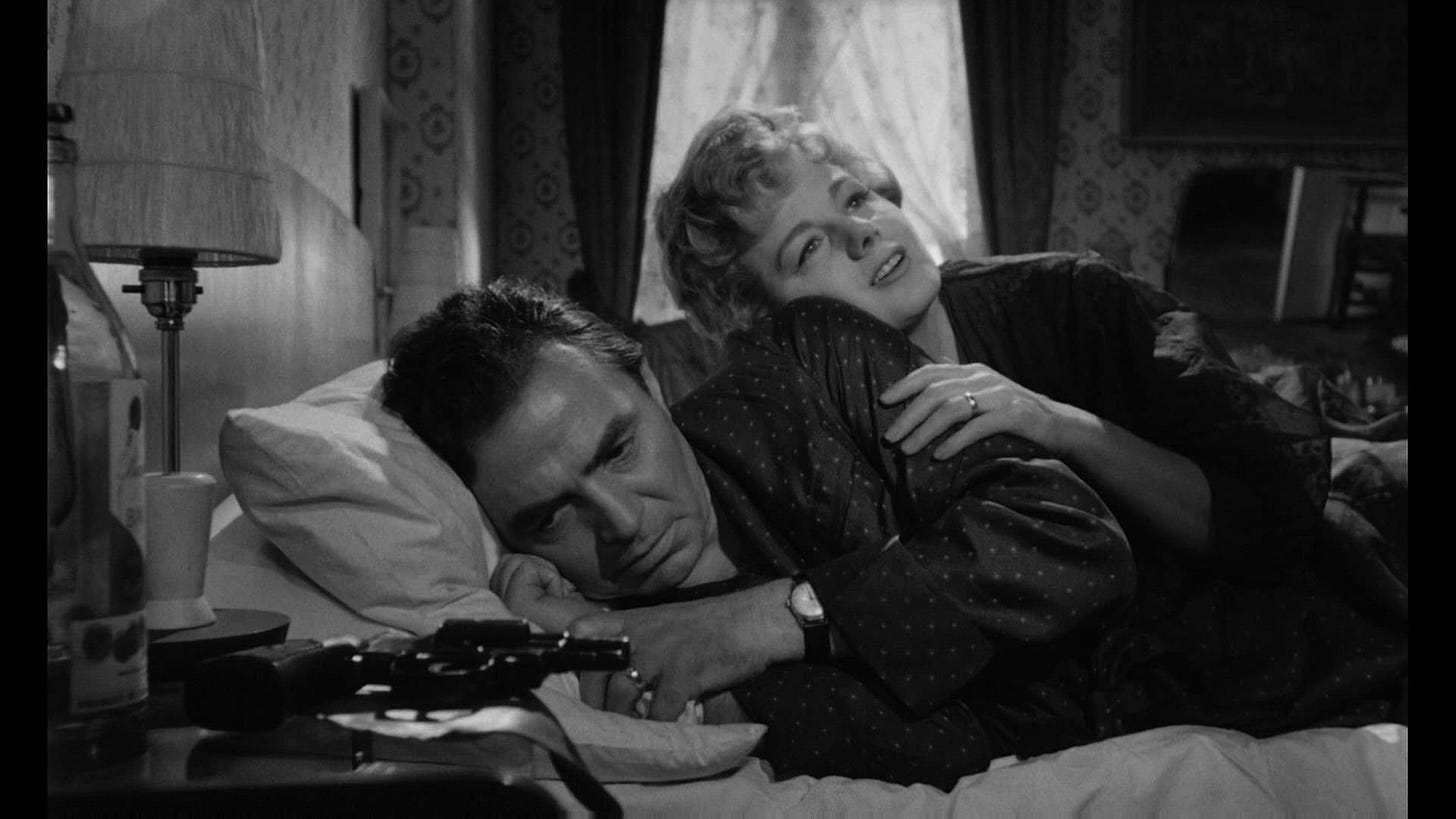Back when you flipped through channels at night to find something to watch, I came across a giant octopus picture called Tentacles (1977) in which John Huston and Shelley Winters played brother and sister. Huston was telling her, in his grand voice, that their mother had told Shelley to stay away from candy; the look on his face was humorous, as if he knew what was coming. Winters clutched her ample bosom and cried, “This isn’t candy, it’s passion!” I howled, and not because we were supposed to be laughing at her. (Tentacles, believe it or not, is a progressive movie in that respect.) This moment summed up the joie de vivre and defiant fun of Winters better than just about any other scene she did, and she did a lot of scenes: she has 162 credits on her IMDb list that run from 1943 to 1999.
Her gabby kiss-and-tell 1980 autobiography and its later sequel are not too reliable, for Winters can’t help but get carried away by a story or a tall tale or a boast, and she has a hard time keeping on track, which was a staple of her many TV talk show appearances of the 1970s and ‘80s; she fudges her age, and so Winters has to confusingly move stories back and forth in time to keep this ruse going, and she is easily distracted. “All the things I’ve written about are exactly as they happened,” she insists at the end of the book. “Some things are even exactly as I wish they hadn’t happened. Perhaps a few things are exactly as I wished they had happened. However, I will never know the difference…nor will you.”
When Winters recounts in this memoir entering a restaurant or bar to meet, say, Errol Flynn, she can’t help but remember every detail about the lighting and where people were sitting until it feels like we will never get out of this restaurant, but this is all part of her motto of living life to the fullest and investigating every detail, which is why she was one of the most zealous members of the Actors Studio and drove many of her co-stars nuts with her need for motivation and sense memories and so forth. She always seemed to be chattering, and even when she wasn’t gabbing Winters had a tendency to make nauseated sounds in between words, so that sometimes she seemed to be making an acting style out of indigestion.
Winters was born in 1920 and worked her way up in show business with all the brass and nerve at her disposal, which was always considerable. She first came to attention with a soubrette role in the musical Knickerbocker Holiday (1944), where she is the ultimate in shameless “notice me!” comic business in a way that feels theatrical. Winters was stuck in bits for a long time before George Cukor tapped her to play the doomed waitress opposite Ronald Colman in A Double Life (1947). “You want to know something?” Winters asks Colman as she waits on him. “You’re cute!”
Cukor, who always loved the most uninhibited behavioral vulgarity, gives Winters a frame to operate in for A Double Life where she can be as funny and low-down as possible as this brazen girl looking for “connections” who says she is trained to give massages: “I could show you a certificate...I took a course!” she insists, hilariously. This movie inaugurated a film tradition that insisted “Shelley Winters Must Die” by having Colman strangle her at the end, but nothing can extinguish the memory of her coarse vibrancy here and elsewhere.
Universal put her under contract and worked her unusually hard for seven years in all manner of movies: westerns, noirs, comedies, musicals, and Winters was game for them all, reliably funny in a Mae West-like way when necessary, but still best as a crass victim, as with her Myrtle in The Great Gatsby (1949), who gets mowed down by a car. Universal built her up as a sex symbol, but Winters took the de-glam route to a radical extreme in A Place in the Sun (1951), her own favorite of her films, where she plays the pitiful factory worker Alice Tripp. Her performance in this movie is controversial; even her co-star Montgomery Clift felt that she was playing it wrong, that Alice didn’t need to be as forcefully drab and passive aggressively excruciating as Winters makes her.
It is true that Winters perhaps goes too far in her final scene in the boat where she practically goads Clift into killing her off so he can be with Elizabeth Taylor’s gorgeous and rich Angela Vickers. But there are people in life like Alice Tripp. We don’t see them much in movies maybe because there are times we can’t avoid them in life, so writers avoid putting them down on paper and actors certainly try to avoid playing them. Yet Winters always had a frank insistence about all aspects of existence, even or especially the unflattering or downright awful things people can be or do.
The year that her contract with Universal finally all but ended, Winters got herself into another classic, The Night of the Hunter (1955), directed by Charles Laughton, a great actor she studied acting with at his house in Hollywood. Her dim Willa Harper is another victim role, a lamb to the slaughter for psychotic preacher Harry Powell (Robert Mitchum), but Winters finds moments before the preacher stabs her to death where Willa is seen as almost welcoming her demise, a psychological insight that showed how up-to-date she was with human behavior; she was in analysis and loved to go for the scariest choices as an actor. Willa is last seen as a corpse underwater, her hair flowing outward, her face at peace.
Winters won the first of her two supporting actress Oscars for The Diary of Anne Frank (1959), a solid characterization that has the vitality and the hurt of all her best work, but she is far more memorable as culture vulture Charlotte Haze in Lolita (1962), especially in the electrifying moments when she attempts to compete with the empty brilliance of Peter Sellers. Winters’s Charlotte is one of her most comic roles, a knowing send-up of a strain of American pretentiousness that she plays for laughs but also with some respect for this woman’s relentlessness, which is something like her own.
She did Jean Genet in The Balcony (1963), played madam Polly Adler in A House Is Not a Home (1964), picked up a second support Oscar for going all out as a vicious racist mother in A Patch of Blue (1965), and played Natasha in a film of the infamous Actors Studio production of Chekhov’s Three Sisters (1966) where everybody is lost in their own private moments, and her work rate stayed game and robust through the rest of the decade.
Winters is terrifying in the scene where she murders a girl by holding her underwater in Bloody Mama (1970), very extreme yet focused, and she herself notoriously held her breath to rescue preacher Gene Hackman in The Poseidon Adventure (1972). But it was on television that Winters got an opportunity to show what she could do as a mature performer in A Death of Innocence (1971), where she plays an uptight, ultra-controlled woman trying to help her daughter through a murder trial. In the short running time of this TV movie, Winters takes us step by harrowing step through the process of her character realizing just what a bad lot her daughter is, a worst nightmare scenario that she makes punishingly real.
It was in 1976 that Winters gave perhaps her finest performance as the unhappy and dominating mother in Paul Mazursky’s autobiographical Next Stop, Greenwich Village. As in all of her best work, Winters bravely and maybe helplessly gives us no room for relief in her portrait of a woman who had bigger dreams for herself than the life she has been reduced to in her kitchen in Brooklyn, but the comedy of her work here comes from the way that her character is seen as constantly punishing her son and her husband with this knowledge.
Again, Winters offers an unsparing portrait of passive aggression without ever letting us hate the person she is playing; by the end of this movie, it is as if we are all her sons and daughters and she might come charging in at any moment to complain about our apartment or give us a chicken to cook in a pot she has brought for that purpose. Food is love to this lady, just as food was something the hedonistic Winters rarely denied herself, just as she rarely turned down a roll in the hay and claimed a long list of conquests from Burt Lancaster to Marlon Brando; she said that when she roomed with Marilyn Monroe that they made up a list of men they wanted to sleep with.
On television, Winters made headlines on The Tonight Show with Johnny Carson when she came back to pour a drink over the head of an insultingly sexist Oliver Reed, a riveting piece of television that can be seen in full on YouTube; over the course of 16 or so minutes, we can see the tension between Winters and Reed slowly building, and he’s not wrong to complain sometimes about her butting in during what is supposed to be his interview time with Carson, but when he starts to bring out his crap about the place of women in society, it is like poison that Winters is being forced to ingest live on TV, and so she finally has to put a stop to it with a big dramatic gesture. Of all the things she did in the sphere of publicity and celebrity promotion, which was very important to her at all times of her life, this is the one that remains a classic, and it is classic Shelley because she was doing it as much for herself as for women in general.
She worked on in obscure pictures but reemerged as the grandmother on Roseanne in the 1990s and then, very unexpectedly, as the wife of John Gielgud in the 1996 film of Henry James’s The Portrait of a Lady, a classy near-exit for the one-time Shirley Schrift, who learned her lessons in hard knocks on the streets of Brooklyn and Queens. After a period of ill health, Winters died in 2006, and one of her acting disciples, Sally Kirkland, gave her a version of the last rites.
But doesn’t it seem like Shelley Winters is still here somehow and might turn up with another book, or might somehow give another chatty interview? Winters was omnipresent for at least half a century, and there are scads of movies she should have passed on, but in A Double Life, A Place in the Sun, The Night of the Hunter, Lolita, A Death of Innocence, and Next Stop, Greenwich Village her urge to show us the sordid, the squirmy, the uncomfortable, and the gross made her a unique presence filled with both candy and passion and so much else.
PS: A Death of Innocence is difficult to find…for anyone interested, here is a link to it below:











It's so interesting to see Winters playing such a repressed, controlled character in "A Death of Innocence," and she does it so well, with such skill....this is a perfect example of how effective casting against type can be.
There's so much to explore with her...including her memoirs, her talk show appearances...and she's good value in even her Universal programmers and some of the more questionable choices of the 1970s and '80s.